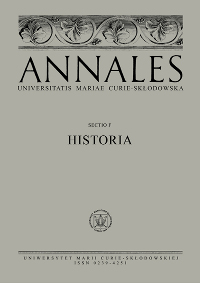Studenci w dobie „Solidarności” (1980–1981). Wizja reformy uniwersytetów w Polsce w świetle materiałów łódzkiego strajku studenckiego
Students in the Time of “Solidarity” (1980–1981): Vision of University Reform
in Poland in the Light of the Materials of the Lodz Students Strike
Author(s): Krzysztof LesiakowskiSubject(s): Social Sciences, Education, Higher Education , Sociology of Education
Published by: Wydawnictwo Naukowe Uniwersytetu Marii Curie-Sklodowskiej
Keywords: Independent Self-Governing Trade Union “Solidarity”; Polish People’s Republic; higher education; Lodz students strike; university reform
Summary/Abstract: The discussed topic refers in a chronological and problematic way the history of the Independent Self-Governing Trade Union “Solidarity”. In in the years 1980–1981, the social movement “Solidarity” caused fundamental changes in Poland. These highly dynamic transformations involved the Polish student community too. Students began to express their reflections on the condition of Poland and directions for repair. Especially wide conception for the reform was created during student strike in Lodz. The protest began on 21 January and lasted until 18 February 1981. This long-lasting sit-in protest was a period of especially high activity of academic youth in the program sphere (postulates, slogans on posters, opinions shared in discussions). Over time, selected postulates became the subject of negotiations with the commission representing the government of Polish People’s Republic. From the presented demands and the discussions about them emerges the students’ vision of the university (higher education) as an autonomous institution, whose directions of functioning were to be decided collectively by individual elements of the academic community (professors, younger researchers, students). Universities attained organizational, didactical and financial autonomy, whereas the students were given a lot of freedom in shaping their own educational path (plenty of flexibility in choosing courses, adjusting the seminars and specialized classes to their interests, removal of so-called ideological classes). Moreover, it was clear that academic youth wanted to use the freedom to involve themselves with an independent organization. It was also assumed that the restructured university would function in a free and unhampered manner – without pressure from police and secret services officers, without limits imposed by censorship. On this basis, it can be said that the Polish students in 1980–1981 created a serious program for the reform of universities and the restoration of Poland.
Journal: Annales Universitatis Mariae Curie-Skłodowska, sectio F – Historia
- Issue Year: 76/2021
- Issue No: 1
- Page Range: 367-386
- Page Count: 20
- Language: Polish

